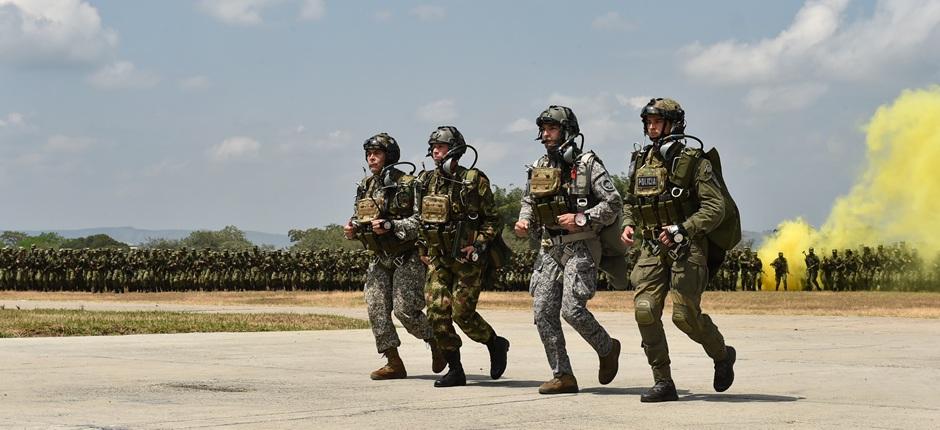With the premise of strengthening State legitimacy and democracy and a solid respect for human rights, the President of the Republic, Iván Duque, presented on Wednesday the Defense and Security Policy, which responds to the different criminal phenomena and the different threats that harm the Colombian population (see broadcast: https://bit.ly/2Gs2rs3).
The document, which as of today becomes the road map of the Military Forces and the National Police and of the National Government as a whole, is focused on the construction of legality and seeks to respond to the different phenomena of crime such as drug trafficking, illegal material extraction, extortion and contraband.
In addition, it provides solid tools to face security challenges such as Organized Armed Groups that, through criminal and terrorist operations, attack on citizens and seek to destabilize territories and hinder the effective operation of the State.
The Policy, which is designed to reestablish the principle of authority and move from military and police control to institutional control of the territory, protects all the inhabitants of Colombia and is articulated with the policies that the National Government is carrying out regarding the protection of social leaders. (Timely Action Plan – PAO, in Spanish), Policy of Peace with Legality, Foreign Policy and Comprehensive Policy to face the problem of drugs “Future Path”.
One of the transcendental changes of the Policy is to classify the water, the biodiversity and the environment as the main and prevalent national interest and, therefore, they become a matter of national security, their protection and preservation against foreign interests, predatory operation of drug trafficking, illegal extraction of minerals and deforestation.
The document in the same way establishes five substantial pillars that seek to lead the Defense Sector towards a strategic transformation, aimed at guaranteeing human dignity and the protection of the entire population and the territory, as well as the respect and validity of the institutions to procure the wellbeing and the rule of the legal order and democracy.
The first pillar is the recognition of water, the biodiversity and the environment as strategic assets of the Nation. This recognition is necessary in a global context where possible conflicts are foreseen due to the access and control of these resources; Colombia enjoys innumerable sources of them.
The second pillar establishes cooperative security; that is, models of international security based on the cooperation of States to guarantee international security and peace, in the framework of international law, as a tool through which defense diplomacy is strengthened while at the same time dissuasive capacity is maintained.
The third pillar proposes the disruption of crime, with emphasis on the dismantling of illicit activities. The focus is hitting the entire illegal value chain, as well as the other associated activities and the goods resulting of them, as well as hitting criminal groups.
The fourth pillar emphasizes the intervention and recovery of the territories, especially in those areas where security problems are concentrated, has gaps or the institutional presence is precarious. Given the aforementioned, the policy establishes interventions to move from a purely military control to an institutional control of the territory.
The result are the strategic areas of Comprehensive Intervention (ZEII in Spanish), territorial spaces where high crime rates are high and there is unsatisfied basic needs, extreme poverty and population in vulnerable conditions, besides being as geographical areas of national interest by its growing environmental value, in water resources and / or biodiversity.
One of the main efforts will focus on replacing illicit activities with legal ones to generate legality, entrepreneurship opportunities and new forms of development in these regions.
Finally, the fifth pillar contemplates developments in innovation, science and technology, which seek to be at the forefront when counteracting new forms of criminal actions carried out by criminal organizations.
Regarding the so-called "bilateral ceasefires", the Policy rejects this figure as a possibility, because it is contrary to the constitutional obligation of the authorities to permanently guarantee the life, honor and property of Colombians.
This new navigation chart has no ambiguities regarding security and the fight against crime. However, to carry out processes of dissolution of an outlaw organized armed group, two conditions must be met: the concentration of the entire armed structure in delimited geographical spaces and the cease of all types of criminal activity.
(With information of the Ministry of Defense)





